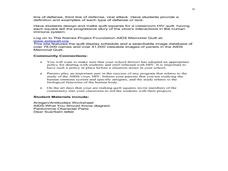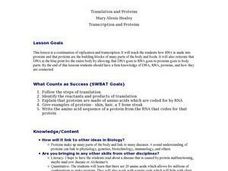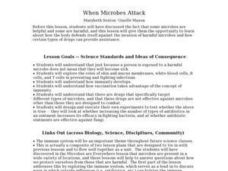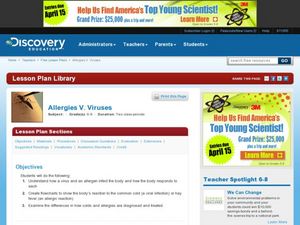Biology Junction
Plasma Membrane – Gateway to the Cell
Just as skin covers your body limiting what can go in and out, plasma membranes cover cells to do the same. Scholars begin with a presentation that gives overview of the structure and function of plasma membranes. Then, they learn how...
Curated OER
Your Body's Defenses When Microbes Attack
Students study how being exposed to a harmful microbe doesn't automatically make them ill. They discover the lines of defense against microbe invaders and explore the roles of skin and mucus membranes, white blood cells, and lymphocytes...
Curated OER
Skeletal, Skin, and Muscular Systems
Eighth graders explain the functions of various body systems. Using a concept map, 8th graders identify and explain the fuctions of the skeletal, skin, and muscular systems of the body. After completing their concept map, students...
Curated OER
Body Organization and Organ Systems
Eighth graders begin the lesson by building a house of cards. They discuss ways that building a house of cards is similar to the way the body is built: different systems work together to help the whole body work together. Students listen...
Children’s Hospital of Philadelphia
The Innate Immune System
My body is my castle. Pupils learn about the innate immune system in the second lesson plan of a three-part unit on the immune system by comparing the innate immune system to a castle and moat. Groups conduct a simulation where they try...
Curated OER
Antigens versus Antibodies "KO'd in Round Three" The Third Line of Defense of the Human Immune System
Seventh graders investigate antibodies, as the body's third line of defense against disease. They discover why antibodies do not defend the body against viruses and create a pantomime of the antibody/antigen/HIV relationship.
Curated OER
Onion Skins
Students explore the structure of a plant cell. They carefully peel a single layer of onion skin from a slice of onion and stain it with methylene blue to observe the structures inside. They use a Digiscope connected to a computer to...
Curated OER
I Belong To . . . (The Senses)
In this senses worksheet, students match the descriptive words with the body part is belongs to: ear, eye, nose, mouth, or skin. This worksheet has 20 matching questions.
Pleasant Valley Community School District
Integumentary System
This document can be used as a slide show to introduce your human body systems class to the integumentary system, also know as skin. Topics outlined include the roles of skin, details about its its layers, and color (cause and...
Curated OER
Translation and Proteins
Learners follow the steps of translation and identify the reactants and products of translation. They able to explain that proteins are made of amino acids which are coded for by RNA. Students are able to give examples of proteins--...
Curated OER
You...Instead of the Onion Skin
Students observe their own epithelial cells from the inside linings of their cheeks using DigiScope technology. They prepare a slide with both onion cells and epithelial cells and make an illustrated booklet for a PowerPoint presentation...
Curated OER
Investigating the Method by Which the Body Defends Against Pathogens
High schoolers explore disease caused by bacteria and viruses, how they are transmitted, and how they exert their effects on their hosts. They explain how diseases, such as AIDS, are spread by exponential growth.
Curated OER
When Microbes Attack
Pupils study how the body defends itself against the invasion of harmful microbes and how certain types of drugs can provide assistance. They design and execute their own experiments to test whether increasing the number of types of...
Curated OER
Simulation of Laparoscopic Surgery Lab
Students, having learned how to manipulate the instruments, insert the instruments into the "ports" of the plastic membrane, trying to clip, cut, staple the sponge organ according to the function of the instrument.
Curated OER
Allergies V. Viruses
Students examine how viruses and allergens affect the body. In this viruses lesson students create flow charts and examine the differences in how colds are diagnosed.
Curated OER
I Belong to.....(The Senses)
In this neuroscience for kids worksheet, students identify whether each of the 20 body parts listed belongs to the eye, ear, nose, or mouth.
Curated OER
Using Microscopes
Students do an experiment using a microscope. In this lesson, about cells, students examine different slides using a microscope. Students look at an onion skin, cheek cells, and potato cells. In each of these, students find cell walls,...
Curated OER
Tissues
In this tissue worksheet, students are given notes on 6 types of epithelial tissues, 10 examples of connective tissue, three types of muscular tissue and the components of nerve tissue.
Curated OER
Cells and Cancer
Students idenitfy that cancer is a growth of mutated cells and that cancer cells are only one type of cell that causes disease in our body. They also identify that all eukaryotic cells contain a nucleus, cytoskeleton, and a cell...
Curated OER
Lymphatic and Immunity
In this biology learning exercise, students identify and locate various vocabulary terms related to the lymphatic and immunity systems of the body. There are 42 biology terms located in the word search.
Curated OER
Immune, Lymphatic System
A fantastic slideshow that has images, details, definitions and trivia to accompany each structure and response involved with the immune system. The slides are very useful for all levels of the immune response. A complete sets of notes...
Curated OER
Tissues
Complete with teachers' notes for most of the slides, this is a tremendous presentation of the four types of tissues: epithelial, connective, nerve, and muscle. Each is displayed with pertinent vocabulary and photos of microscope slides...
Curated OER
Amphibians
In this amphibian worksheet, students will review the characteristics of the class Amphibia, including frogs and toads, salamanders, and caecilians. This worksheet has 3 short answer questions, 5 matching questions, 6 multiple choice,...
Curated OER
Fishes
In this fish worksheet, learners will use fish characteristics vocabulary words to fill in the blanks of 3 statements and a crossword puzzle.























